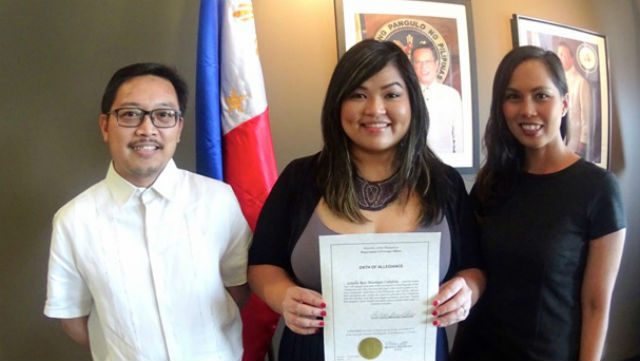SUMMARY
This is AI generated summarization, which may have errors. For context, always refer to the full article.
 RHODE ISLAND, USA – On the first day of October, Louella Cabalona took an oath to become, once and for all, a citizen of the United States of America.
RHODE ISLAND, USA – On the first day of October, Louella Cabalona took an oath to become, once and for all, a citizen of the United States of America.
Later that day, she went to the Philippine consulate, where she reclaimed her Philippine citizenship – and by the end of the day, registered to vote for the 2016 elections in her homeland.
“I had all the time between now and the end of October to register,” she said over the phone, a grin in her voice. “But I wanted to be able to tell people that there was never a day that I wasn’t a Filipino.”
She is not alone. Louella is one of several Filipino Americans who have chosen to heed the call of the country, claim their dual citizenship, and register to vote. She is part of an even bigger movement, bubbling to the surface over the past few years, of Filipino Americans who have chosen to turn balikbayan into an active verb – to take concrete steps toward understanding the present and getting involved in shaping the future of our mother nation.

Louella’s story is one that likely resonates with many. She was born in the Philippines, lived there til age 26, and moved to the US for a 3-month consulting project that extended, then extended, until before she knew it she had a permanent job and a husband and a new life on the other side of the world.
For a time, she fought with herself about whether to stay or to return – but “it was a different time,” she said. “It was during the Arroyo years, and things felt like they were spiraling downward. In the end, I had a conversation with my best friend and she said what we were all thinking: I didn’t want to lose the opportunity that I had here in the States.”
Despite this, she has always been an active worker for the Philippines from abroad. In her new home in Chicago, she taught Filipino culture through her Filipino Folk fusion band and theater arts. In 2012, she went back to the Philippines with the Philippine embassy’s FYLPro program, which brings young Fil-Am leaders back for a week of networking with different leaders across business, public, and social sectors. The experience lit a fire in her – and now, 3 years later, she acts as the program’s vice president.
So for her, the decision to reclaim her citizenship was natural. But what of everyone else – the 12 million other Filipinos living outside the Philippines, many of whom are no longer citizens? Louella cites a sense of fear as a barrier to many: “Some people are scared that it endangers their American citizenship,” she says, “that it’s a sign they’re not loyal. But it’s a different world now, where around half of countries allow dual citizenships.”
For others, it’s a sense of imagined bureaucracy. Especially for those who have waited for years to claim their American citizenship, the idea of going through another naturalization process sounds daunting. “But for me, it took less than a week,” Louella says. “I went with my birth certificate, marriage certificate, passport, naturalization documents, and it went fast. I registered to vote the same day.”
Moment in time
And for others, there’s a sense of detachment and apathy: Why reach back? Is there anything we can do? To Louella, this attitude is often rooted in an old image of the Philippines, an antiquated understanding that misses how much the Philippines has changed and is changing.
“The Philippines is booming,” she says. “We have businesses rising.” In the midst of this surge of leadership, our own role as diasporas, as global agents of support and partnership, is becoming richer, more diverse, and more urgent.
“Since I went back through FYLPro and discovered this movement,” Louella says, “I’ve had this hunger for news of what’s happening and who’s making a difference.” She now tries to amplify these voices of progress, broadcast these stories, and in the end educate the world about this new landscape. And whenever she tells people, she recalls that the reaction would be the same: “I didn’t even know that was happening.”
Global identities revisited
On citizenship, Louella has a message to all the other balikbayans out there: “People take it as a given that it’s a privilege to be American. I want people to know that being Filipino is the same. If you have the opportunity, if you have that birthright, then you should claim it.”
The deadline to reclaim one’s citizenship and register to vote as a Filipino was October 31st. Will our global nation seize that window of opportunity? Louella is glad she did; she can’t wait to tell the story to her grandchildren one day, she says, of when she claimed her American and Filipino citizenships on the same day.
On one hand, she is happy to be an American after so many years. “I feel like I finally belong in this place I’ve called home. It must be the same feeling when adoptees are officially adopted by their parents.”
On the other hand, she is thrilled by everything her continued Philippine citizenship means: a commitment to stay connected, a right to vote, and also a chance for her children and their children to be Filipino citizens.
“It’s not the same world as before, when being hyphenated was something to be ashamed of,” Louella says. Instead, it signifies potential, power, and a responsibility to be a global leader and citizen: for the Philippines, and for our globalizing world. – Rappler.com
Rexy Josh Dorado is co-founder of KayaCo, a Harvard and Brown University organization of Filipino American undergraduate students. Rexy was born in Dumaguete City, Philippines, and moved to the Cleveland area in 2003. He has been trying to thread his story back into his homeland’s since.
Add a comment
How does this make you feel?
There are no comments yet. Add your comment to start the conversation.